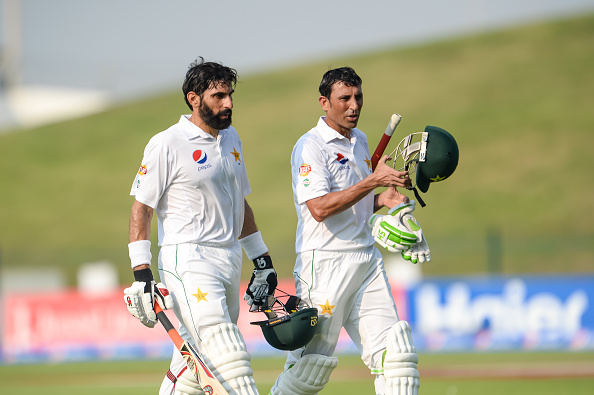
The Pakistan that Misbah-ul-Haq and Younis Khan created

On the 4th of May 2017, Pakistan are chasing a target of 188 against the lowly ranked West Indian team in Bridgetown, Barbados. It seems an ask not too huge. But Pakistan fluff the chase, in a massive manner at that. They lose their first seven wickets for 36 and are eventually bowled out for 81.
Looking at them play, there’s no way you can say that they were, briefly, the top-ranked team in Test cricket.
It may now seem unbelievable, but up until the evening of 3rd October 2016, Pakistan were the number one ranked team in Test cricket.
Pakistan are not like the numero unos of yore. They don’t have a team full of unbelievably gifted players at their disposal at all times. They don’t have a killer instinct. And above all, they don’t have the clout, the aura that is characteristic of the best sides.
This Pakistani team is none of that.
It is a team of regular cricketers, not of geniuses or unreal superstars. It’s a team with flaws, not one with surplus perfection. It’s a team which wins matches through spirit, and not through superlative skill.
In that sense, this is a very human team.
And nowhere is it more visible than in its journey to the top.
The first season of the IPL, in 2008, was probably its best. The format was new and exciting, the concept completely unlike any we had seen in cricket thus far. There was a certain novelty to it which made it grand, even a touch majestic.
And there were moments, cameos or little bursts of brilliance with the ball which made headlines and left people gasping for their caffeine infested breaths.
One of them, and probably the most defining one, was provided by Shoaib Akhtar, of long hair, thunderous speed and a love for the gallery. Clad not in the green of Pakistan but in the part Batman, part Indian taxi, black and yellowish gold of the Kolkata Knight Riders, he smiled his way to a four-wicket haul against the Delhi Daredevils.
In this most glorious of fast bowling displays, he did what not many thought was possible. He got the whole of Eden chanting his name where once they would not think twice before deriding it.
At the post-match presentation, team owner and Bollywood megastar Shah Rukh Khan couldn’t keep himself off Akhtar’s imposing frame, sometimes hugging, sometimes high fiving and sometimes fist pumping him.
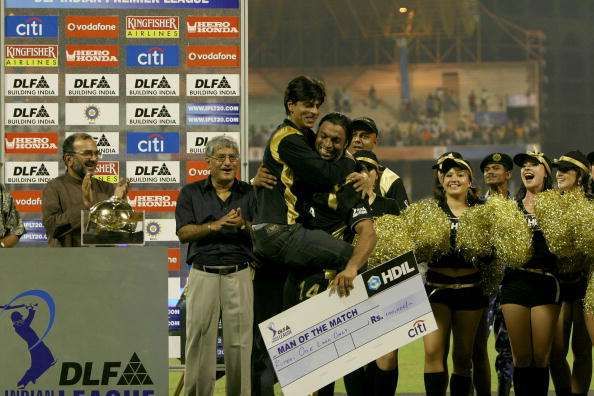
Injuries prevented him from playing too many matches that season. Disappointed as we were, we reassured ourselves that he would be back next season.
Except he was not, and nor anyone else holding the same passport as him. Not next year, not any year after that.
A few months out from the end of the first IPL, on the 26th of November, ten Pakistani terrorists carried out a massive attack in Mumbai, killing more than 160 people and fracturing the psyches of many, many others.
The BCCI cancelled the Indian tour to Pakistan which was supposed to have taken place in December and January.
They also barred Pakistani participation in the most financially profitable league in world cricket.
The Pakistani players would never see the kind of money their competitors did, nor would they get half of the exposure they got.
Their growth was stunted, their wings clipped.
They wanted to fly.
But reality didn’t agree.
March 3, 2009. Sri Lanka and Pakistan are in the middle of a Test match at the Gaddafi Stadium in Lahore. It’s a boring match, a run fest. And a draw seems inevitable. The surety of events that would take place on the last two days of the game seems to match that of the darkness which accompanies the night.
But on the morning of what was supposed to be the third day of the Test, a battery of 12 heavily armed terrorists attack the Sri Lankan team bus on its way to the stadium. Five cricketers and one umpire are injured. Six policemen and two civilians are killed. And if not for the presence of mind of Meher Khalil, the man driving the Sri Lankan bus, the situation would have been a thousand times worse.
The Test and the tour are called off. The then ICC president David Morgan declares Pakistan to be “a very dangerous” place to play international cricket. Other boards call off future tours, and the 2011 World Cup is also shifted out.
This is the beginning of Pakistan’s home cricket exile.
One, which barring a short limited-overs trip from Zimbabwe in 2015, still continues.
For now, and for the foreseeable future, UAE will be the place where will they host teams.
Theoretically, they’re playing at home. In actuality, home has never been further.
Still coming to terms with their IPL ban and home exile, Pakistan did extremely well to win the 2009 World T20 in England. And over the course of that tournament, they had unearthed a 17-year-old left arm pacer, one described by the legendary Wasim Akram as better than him, who would take the world by storm in the next year and a half.
Mohammed Amir, in 2009 and 2010, was what God sent down after years and years of prayers by cricket tragics who wanted to relive Holding, Garner, Lillee, Thompson, Ambrose, Wasim and Waqar.
He was the kid who could change cricket, the kid who could convert the most ardent haters into hopeless cricket romantics. He was cricket’s angel, the one with a brilliant inswinger.
Until the end of August in 2010, Amir was all cricket stood for. Hope, dreams, aspirations, magic.
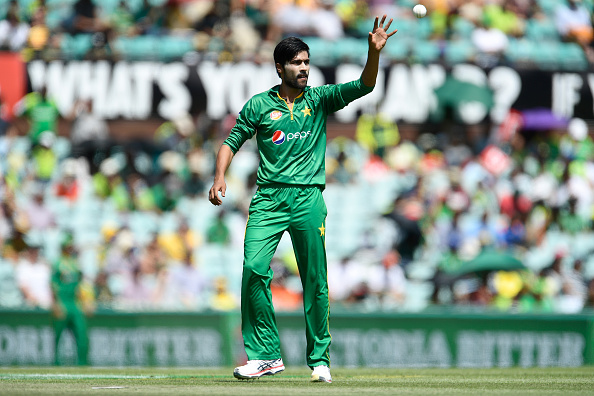
For Pakistan, above everyone and everything else, he was their silver lining, their boy wonder. And after all these multiple setbacks, he was all they had left to cling on to.
In partnership with another gifted but notorious fast bowler, Mohammed Asif, he gave many of us moments we would spend hours drooling over. With them in action, cricket had an ideal advertisement, one which its inventors probably dreamt of.
In 2009 and 2010, Amir and Asif together were the cricketing equivalent of Sherlock Holmes and John Watson. Together, they were what cricketing utopia looks like. Not a word more, not a word less.
And then Satan struck.
As with the greatest magic tricks, the kind that take us beyond ordinary logic or sense experience, this was to be just an illusion, a temporary phenomenon that managed to obscure reality for 18 months.
On 28 August 2010, a ‘News of the World’ sting operation laid bare the crimes Amir, Asif and their captain Salman Butt had committed during the course of a Test match against England at Lord’s.
They had accepted money in exchange for bowling no-balls at pre-fixed junctures.
Spot Fixing, they called it.
For the wounded cricket lovers, the charge didn’t seem heavy enough. It probably wasn’t.
One of the most important aspects of law, one that its ethics repeatedly stresses on is that until proven guilty in the court, the convict shall be regarded as innocent. It didn’t apply to this trio, it felt. And again, no one can fault fans of the game and fellow countryfolk for feeling betrayed by their actions.
Traitors. Cheats. Thugs. Criminals. Disgraces. That’s what they were called, and this was not even the worst name-calling they were subject to.
They were, sure enough, banned from international cricket. Amir, for five years, because of his naivety. Asif, for seven. And Butt, for ten because he was the one who dragged Amir and Asif into it.
Pakistan, in one stroke, in the course of three overstepped deliveries, lost not just their two best bowlers and their captain but also their credibility. They lost respect. They lost fans, they lost fixtures. And God only knows how many kids who wanted to take up cricket were denied from doing so by their parents.
Pakistani cricket, one of the few bright spots for a ravaged nation, lost virtually everything it had by this point.
The decline was well into motion. The end, where they would just be another diminished force, seemed nigh, if it had not already come about.
Much like with the nation, people had lost hope.
They had every right to.
But one man who had been there, on the fringes of their cricket for what seemed forever, hadn’t.
That man was Misbah-ul-Haq.
14 July 2016. Thursday. Lord’s. The start of the marquee series between England and Pakistan.
Pakistan win the toss and bat. It’s a brave call, for teams visiting England over the past few summers have been known to be blown away as much by the conditions at hand as by the skill of the English attack.
But Pakistan seem to be doing what they do best, fighting it out. Mohammed Hafeez chances his way to 40 odd, Younis Khan hops, skips and jumps, quite literally, for 33. The solid Asad Shafiq plays well for 73, before being outsmarted by Chris Woakes during the last thirty minutes of the day.
But, today, all of these performances are side shows. It’s their captain who takes centre stage.
Misbah-ul-Haq, of 42-year-old bones and endless grit, makes his tenth Test century.
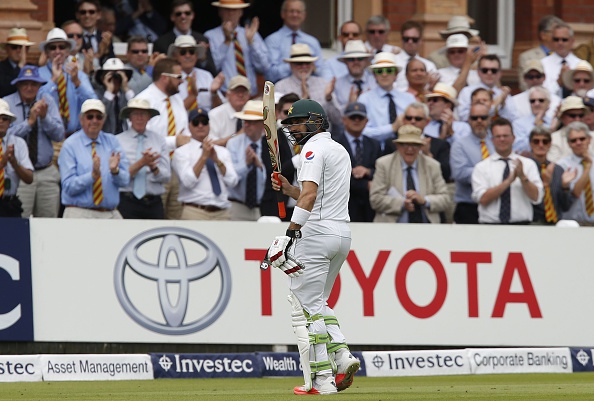
Like they have ever since the end of 2010, they rally around him. He, who is not just the captain of a cricket team, but the flag bearer for what a torn country is capable of. A leader, not just a captain. A figure, not just a man.
Also read: Misbah-ul-Haq: Farewell to Pakistan's silent guardian
Pakistan end the day clumsily at 282, six wickets down.
Misbah stands tall, undefeated on 110.
Yasir Shah takes ten wickets in the match. Pakistan complete a historic victory. Yasir, rightfully, is the Player of the Match.
But this victory wouldn’t have been possible without Misbah. Like most other times, Misbah proves to be the perfect catalyst, one that makes others around him flourish.
At 39, Younis is younger than Misbah, but still quite old by professional sporting standards. While Misbah is the one that carries the team, Younis is, by a fair distance, their best batsman.
To win this series against England, Pakistan need him to pull through for them. Just like he did on the 2006 tour, although that was in a losing cause.
For the first three Tests, for the first 75% of the series, he doesn’t look anywhere close to doing so. It’s not his below average scores – 33, 25, 1, 28, 31 and 4 – but his evident discomfort and wretchedness in the time spent in the middle that raises serious concerns about his future, and dents Pakistan’s fortunes in the second and third Tests, which they lose convincingly.
Also read: The Younis Khan legacy: Of pure grit and unbridled gumption
Out in the middle, Younis isn’t batting. He’s trying to learn ballet without an instructor while trying to somehow dodge 90 mph missiles launched in his direction.
To watch a man with 31 Test centuries bat like that is an awful experience for anyone, English supporters included.
It’s comical, but the pain of it all stops producing laughter after a while.
And Younis, used to dominating attacks and commanding respect from opponents and spectators alike, is now getting just their sympathy.
But, just like his skipper, just like his entire team, he fights. He fights even when no one gives him a chance; when he can’t buy a run. He fights when he’s been humiliated, laid bare in front of thousands of people in the stadiums and millions more watching on the telly.
And in the fourth Test at the Oval, Younis’ fight lasts 451 minutes and 308 balls. He bats as awkwardly as in his first six innings of the series, but his determination to salvage his lost pride sees him through.

He finally learns the ballet. It’s not perfect, but it’s the most amazing.
He walks off to a standing ovation, not one borne out of sympathy, but of sheer respect for a man who fought a losing fight and won it.
Younis Khan, England 2016. 33, 25, 1, 28, 31, 4. And 218.
Pakistan win that match at the Oval. They draw the series 2-2.
And this takes them to the top spot in the ICC Test rankings. The fulfilment of a most unlikely dream. That’s it. They are the best team in the world.
A team of regular men have overthrown the powerhouses of world cricket, with their superstars paid more money in a year than many Pakistanis would make over their careers. They have usurped the cricketing elite, and done so in a manner that will not be forgotten anytime soon.
This is the moment Misbah and Younis spent the best part of the last decade striving for.
Redemption. Success. Love.
They could have retired there and then, in a happy environment, basking in the glory of what they had worked like mad men for.
Instead, they didn’t. They chose to fight this fight for a little while longer.
They wanted to conquer Australia, that ever elusive battlefield.
It was brave. It was to an extent too dreamy, foolhardy maybe. But then so was the desire to reach where they were standing right now. And they had proved logic wrong before.
Only this time, they couldn’t see it through. They couldn’t carry this team of theirs through the final frontier.
They lost five successive Tests in New Zealand and Australia and plummeted to fifth in the Test rankings.
Spot fixing reared its ugly head again in the Pakistan Super League earlier this year. Current internationals including Sharjeel Khan and Mohammed Irfan, amongst quite a few others were found guilty of different offences and banned.
It seemed like 2010 all over again. After everything, it was back to square one.
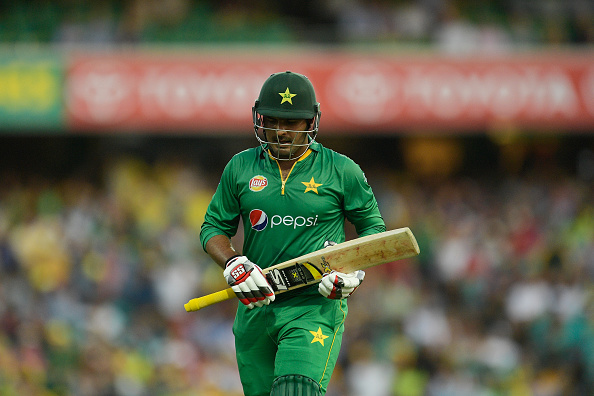
And this is probably what broke both Younis and Misbah. When nothing else could, or even come close to, this did and succeeded. They finally called time on their careers, those as influential and special as one can ever hope to have.
Forget, for a moment where Pakistan cricket is at currently. The mess on and off the field. Forget that and think about what they did, based in the voiceless, lifeless stadiums of the UAE, over the last six years culminating in the Misbah hundred at Lord’s, the Younis double at the Oval and the number one ranking in Test cricket.
Think about that and you’ll be grateful to these two forever.
Pakistan wasn’t the best team in the world.
They had no right to be.
But Misbah and Younis made it into one.
They’re leaving now. And it’s not just Pakistan that’ll miss them. Our beautiful sport will too.